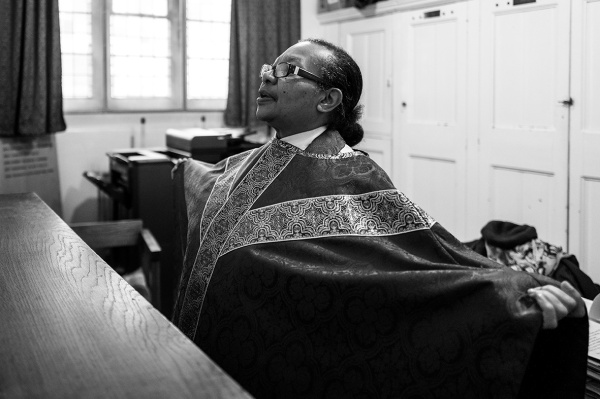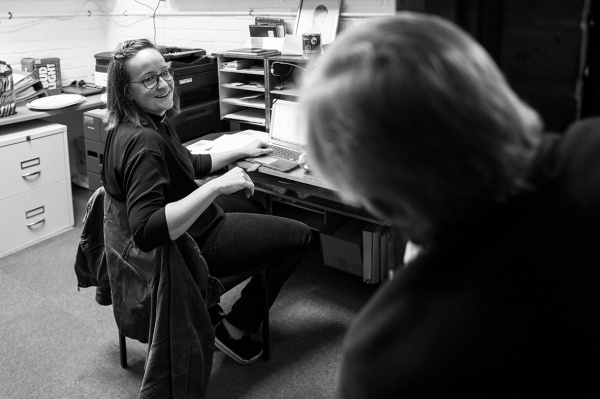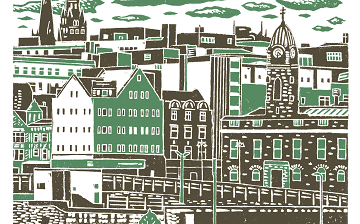Readers of this blog over the years will have picked up various snippets about my backstory. I have given quite a lot away over time because that, I suppose, is how I do my theological reflection, thinking about where I have been and how the things of God have affected me, sometimes perfected me – and maybe, just maybe, it rings a bell for some of those who read what I write.
This weekend we have held at Southwark Cathedral a study morning with Canon Paula Gooder and Professor Esther Mombo of Kenya, a Canon Theologian of Southwark Cathedral and a service to celebrate the 25th anniversary of the ordination of women as priests. It coincides with the exhibition that opened last week in the OXO Tower gallery called ‘Here am I’. The photographer Jim Grover followed twelve priests in the diocese who are women, photographing them as they went about their ministries in very different and varying situations. The result is a wonderful exhibition and telling of the story of some remarkable lives. The photos in this blog are some of the ones in the exhibition, some of my amazing sisters.

Canon Joyce Forbes (picture Jim Grover)
But these women are only the tip of the iceberg, for each of those twelve there are so many other women, as well, of course, as men, doing amazing things in response to the call of God to them. The title of the exhibition is, of course drawn, from the response of Isaiah to the call of God. Isaiah cannot believe what he is hearing God say but finally he responds
‘Whom shall I send, and who will go for us?’ And I said, ‘Here am I; send me!’ (Isaiah 6.8)
It took him a long time – Isaiah knew what he was like, someone lost, a man with ‘unclean lips’. But the Lord convinces him – amazingly it is him that he wants, him that he needs, him that he calls. It reminds us of the wonderful story of the calling of the boy Samuel which is picked up in the popular worship song ‘I the Lord of Sea and Sky’ by Dan Schutte with its chorus
Here I am, Lord. Is it I Lord?
I have heard you calling in the night.
I will go, Lord, if you lead me.
I will hold your people in my heart.
I was born in Leicester in 1957. As children our mum took us to the church she worshiped in and in which she had been baptised, confirmed and married – All Saints, Wigston Magna. It was a lovely medieval building which members of the Oxford Movement had got hold of. It was old fashioned for my tastes now, but that was then and there were few options around in terms of liturgy and it might not have been as old fashioned as I now remember it. We went to the National at Walsingham each year, went off to visit women from the congregation who had joined religious communities. There were vocations, men to ordination, women to the religious life. But that was how things were.
It was there that I realised my own call to priesthood. I had quickly escaped Sunday School and joined the choir. There, siting the other side of the Rood Screen, I could enjoy every moment of the liturgy, the candles, the smoke, the bells, the vestments. The Diocese of Leicester was good to be part of. There was a Diocesan Youth Group that I was part of and a Diocesan Vocations Group. Bishop Ronald Williams was the first bishop of Leicester I really knew, our bishop from 1953-1979 and so through the period of my exploration of vocation he was the one I related to. He was followed by the ‘knitting bishop’, Richard Rutt, who was in post when I finally went off to Mirfield, to the College of the Resurrection, to be formed for priestly ministry.
As I arrived at the College the ASB was published. Things were changing. And other things were changing too. I knew there were deaconesses, of course, but, apart from a few wives there were no women at the College and we were set at the heart of a male religious community. But there was talk of the ordination of women! Women deacons, women priests! I didn’t like that. What about Rome, what about my upbringing, what about all that in persona Christi stuff we were being taught? So, I was ordained opposed to the ordination of women. But there were a lot of people like me, some more vociferous, some fearful of change, some, frankly, misogynist, some confused. But as I was ordained in the Diocese of Ripon for a parish in Leeds there were women being admitted to the order of deaconess alongside me. We were in what we then called ‘Potty Training’ (post-ordination training) together, learning about ministry together. There were some great women who were my contemporaries – Elizabeth, Julie, Catherine – to name but three, women who were ready to challenge my thinking, confront my views and they did.
One in particular though began to change my life. I was sitting in the vicar’s lounge in Holbeck where our Potty Training sessions happened. The door opened and a diminutive young women with big glasses and bright stationary came in and plonked herself beside me on the sofa. We became instant friends and little did I know it then that this person was sent to change my attitudes, to expand my thinking, to challenge my view of priesthood.
Changing your views on the ordination of women was not an easy thing to do to be honest. There was a great deal of peer pressure to remain in the true fold. The churches that I was ministering to were generally of a particular tradition and their congregations generally opposed. My friends shared my views and as the temperature in the CofE hotted up the implications for a change of heart became clearer. You might gain some friends but you might lose some on the way.
Of course, I read the books and the pamphlets that were published, arguments this way and that. They were good books – but to be honest I am more than a heart than a head man and it wasn’t going to be books and academic arguments that would change my mind. Instead it would be my friend on the sofa with the big glasses.
She said she felt called to be a deacon and I could see that call in her. But many people could just about cope with the deaconate. But she also said she felt called to priesthood and …. I could see that too. And it was seeing it, recognising it that changed my heart and my head.
So, 25 years ago I came to Southwark Cathedral. Two friends were being ordained to the priesthood, Julie for the Woolwich Episcopal Area and Alex for the Kingston Episcopal Area. The diocese had decided that there would be three services on the same day in the Cathedral, one for each Area and all the women would be ordained that day. So I was invited to two of the three services. I had seen Southwark Cathedral from the railway line, going in and out of London Bridge station on various occasions. But I had never been in. So I arrived to be warmly welcomed and took my place as history was made – and it was joyous.
It was a big day for those women, ordained as priest, the same priesthood as I was living, but it was also a big day for me personally. Not only had my views completely changed but I had also been asked to ring the office of the then Bishop of Southwark. Bishop Roy Williamson was looking for a new chaplain and my name had been mentioned to him as a possibility. I had rung Bishop’s House. Bishop Roy suggested we meet. ‘I’m coming down for two of the ordinations’ I said. ‘Let’s meet in between them’ he said. And so in the old Provost’s Study in what I call the ‘old new buildings’ at the Cathedral I met Bishop Roy for the first time and a few months later I was appointed as Bishop’s Chaplain and made the move from Leeds to London in 1995. But immediately after the ordinations I caught a flight to New Jersey in the USA to begin a long placement in a parish in a place called Camden. Those three months there would change the rest of my life, my attitudes, my circle of friendships, my confidence, even my daily life. It was the most momentous weekend and as I write this I can hardly believe it all happened like that against the background of the church responding to the call of God to ordain women as priests.
Whilst I was still in Leeds I was meeting with a group of like-minded catholic priests. We held our meetings in the converted porch of the lovely church of St Wilfrid, Halton. So we called ourselves for want of anything better ‘The Porch People’. It was great. So, when I finally moved to Southwark in January 1995 I was introduced to something similar that had been set up here on the Feast of the Holy Cross 1994. The Society of Catholic Priests (SCP) had been formed by men from the catholic tradition who believed in the ordination of all people regardless of gender, ability, sexuality, ethnicity to each of the three orders of ministry. I was among friends. The eight years I was to serve as Rector General of the Society seeing the expansion of SCP into North America and Australia was a real privilege. From that platform I was able to play a small part in seeing women ordained as bishops. It was only a small part but nevertheless it was joyous to be involved.
I had stood for election to the General Synod in 2005 and was elected. I am still on the Synod, in my third quinquennium, but now as one of the five deans. It was being on the Synod, however, that enabled me to stand for election to the Crown Nominations Commission – the body that nominates diocesan bishops to the crown. I was elected twice and the greatest privilege was to be a member of the Commission that nominated the first bishop who was a women to a diocese, Rachel Treweek to Gloucester.
Being a member of the Chapter at Southwark Cathedral since 1999 and Dean since 2012 has meant that I have now worked with a huge number of talented and extra-ordinary ordained women and I am a better priest and a better person for it. But it was Julie, big glasses, colourful stationery that set me on the path. It is she, along with all my other ordained sisters, who I give thanks for this weekend.

Mother Mae Christie (photo Jim Grover)
I don’t know how I used to read the Easter Day gospel when I believed differently about women, how I understood quite what Jesus was doing in the dew soaked garden as the sun rose and he called Mary Magdalene by name and said to her
‘Go to my brothers and say to them, “I am ascending to my Father and your Father, to my God and your God.”’ (John 20.17)
But now I know that Mary was the Apostle to the Apostles. So for every person in ministry I give thanks, but for the women I give particular thanks. It has been a long journey and a very personal one for me, but I’m glad that it was this road that I travelled and I am glad that I travelled it with sisters.
Lord Jesus,
as you called Mary by name
and sent her to make your resurrection known
may we hear your voice today
and go where you send us
whoever we are.
Amen.



You must be logged in to post a comment.